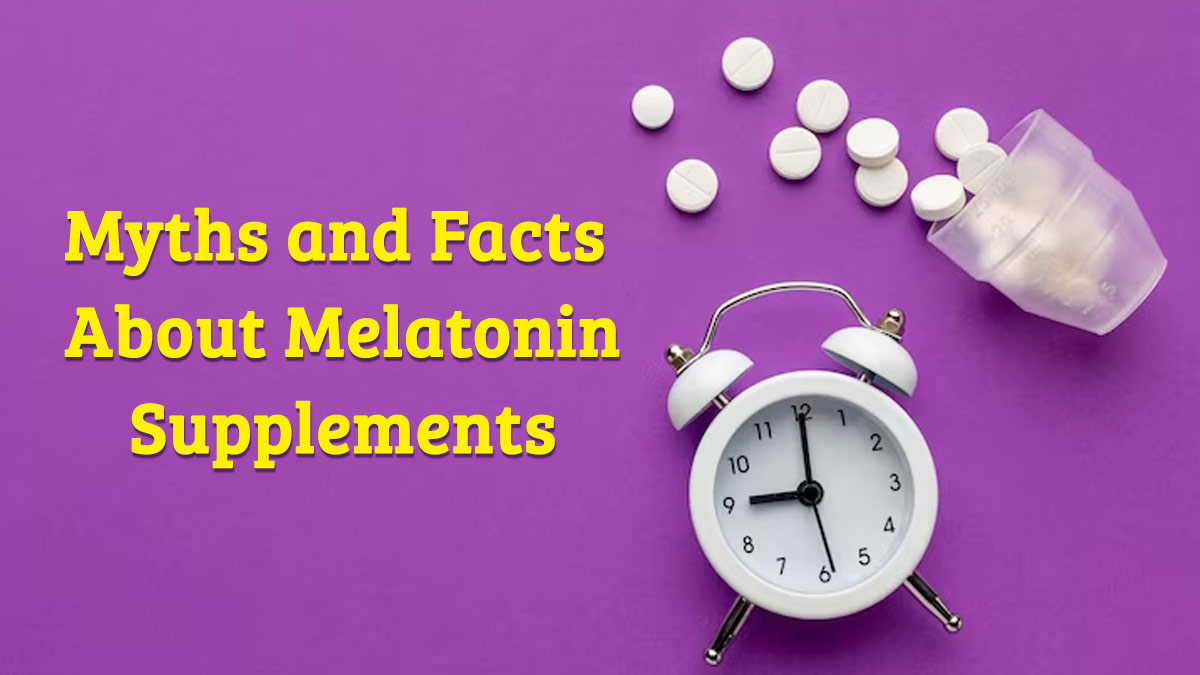
Getting enough sleep is important for staying healthy. But what happens when you have trouble sleeping at night? Well, it causes problems like feeling tired all the time, getting easily annoyed, having trouble remembering things, and even making your body's defences against sickness weaker. As a result, most people use melatonin supplements for help. But can they be addictive and are they safe for everyone? We spoke to our expert Dr Sanjay Singh, General Physician, at Cygnus Laxmi Hospital, who debunked myths about melatonin and stated the facts.
Table of Content:-
What Is Melatonin

According to Anglo-French Drugs and Industries Ltd, melatonin is a substance made by our body, and it's most active at night when we're sleeping. As the night goes on, the amount of melatonin goes down, and this tells our body it's time to wake up. Think of it like our body's natural clock.
Myths and Facts About Melatonin

Myth 1: Melatonin is a Sleeping Pill
Fact: Many believe that melatonin is a sleeping pill, however, it’s not. Dr Singh said, “It is a hormone that is produced by the pineal gland in the brain in response to darkness. It helps regulate the sleep-wake cycle but is not a sedative or sleeping pill. You may be given melatonin supplements to adjust your sleeping patterns or treat certain sleep disorders.”
Myth 2: Melatonin Is Safe for Everyone
Fact: Although melatonin supplements are generally considered safe for short-term use, they can sometimes cause issues if you're taking certain medications at the same time. Dr Singh added, “This can lead to side effects, such as daytime drowsiness. Therefore, you should always consult a healthcare professional before using melatonin, especially for long-term or regular use.”
Also Read: Trouble Sleeping At Night? 6 Ways To Increase Melatonin Production That Can Help
Myth 3: More Melatonin Is Better
Fact: Taking excessive melatonin doesn't necessarily improve sleep and can lead to side effects. Hence, use melatonin supplements at the lowest effective dose. The appropriate dosage varies from person to person.

Myth 4: Melatonin Cures Insomnia
Fact: Dr Singh noted, “Melatonin is most effective for people with specific sleep disorders, such as delayed sleep phase syndrome. However, it may not cure all types of insomnia. It is necessary to make behavioural and lifestyle changes for long-term improvements in sleep.”
Myth 5: Melatonin Works Instantly
Fact: Melatonin typically takes time to become effective. It's not a quick solution for your sleep problems. Dr Singh added, “You should take melatonin 30-60 minutes before bedtime to align with your natural sleep-wake cycle.”
Also Read: Do You Sleepwalk? Expert Explains Its Causes, Risk Factors, And Treatment
Myth 6: Melatonin Is Only for Sleep
Fact: Dr Singh said, “There are various other uses of melatonin like helping with jet lag, shift work sleep disorder, and treating certain medical conditions like depression.”

Myth 7: Melatonin Is Addictive
Fact: Melatonin is not considered addictive. Your body doesn't become dependent on it for sleep, but it's still best used under the guidance of a healthcare professional.
Myth 8: All Melatonin Supplements Are the Same
Fact: Dr Singh noted, “Melatonin supplements can vary in quality and dosage accuracy. So, it's a good idea to pick trusted brands and talk to a doctor to figure out which melatonin product and how much you should take that's right for you.”
Bottomline
Dr Singh concluded, “Melatonin can help fix sleep problems if you use it the right way and get proper advice. But it's not something that works the same for everyone. It needs to be adjusted to fit your sleep issues and situation. So, it's important to consult a doctor to get advice that's just for you when you want to use melatonin.”
[Disclaimer: The information in this article is provided by a registered healthcare practitioner and is for informational purposes only. Hence, we advise you to consult with your expert before trying melatonin supplements.]
Also watch this video
How we keep this article up to date:
We work with experts and keep a close eye on the latest in health and wellness. Whenever there is a new research or helpful information, we update our articles with accurate and useful advice.
Current Version